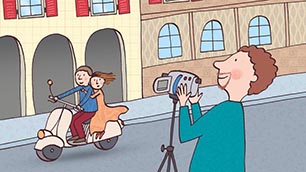| Silvia: | Let's learn a few things about the verbo avere - to have. Avere is as important a verb as the verbo essere. Avere and essere share the same characteristics. Sono entrambi verbi ausiliari, auxiliary verbs, e sono verbi irregolari, which means they do not follow a predictable pattern of conjugation. Ecco the verb avere conjugated in the present indicative:
| io | ho | | tu | hai | | lui/lei/Lei | ha | | noi | abbiamo | | voi | avete | | loro | hanno | |
| Connor: | È molto irregular... irregolare! |
| Silvia: | I know. È also un verbo che ha una caratteristica that no other verbo italiano ha. The forms ho, hai, ha e hanno begin with a silent “h”, the letter h is not pronounced. Do you happen to remember how we say that una lettera è “silent” in Italiano? |
| Connor: | Silvia, I don’t remember... |
| Silvia: | Muta. |
| Connor: | Right! So the “h” is un’acca muta! |
| Silvia: | Esatto. Time to practice the verbo avere with some esempi. Tell me about the Movie Set Travel Agency using the verb "avere". |
| Connor: | Io ho un problema. |
| Silvia: | Molto bene! |
| Connor: | Molto bene? Io ho un problema and you say “molto bene”?! |
| Silvia: | No, dear, I was just happy with your grammar usage! So… tu hai un problema … tell me about it. |
| Connor: | Well, OK… ma ho un problema molto big! |
| Silvia: | Che tipo di problema hai? |
| Connor: | Io non ho any money… |
| Silvia: | In italiano the parola è “soldi”. |
| Connor: | But loro hanno i soldi! |
| Silvia: | Chi sono loro? |
| Connor: | Loro sono the people who want to help me. |
| Silvia: | Sono qui in America? |
| Connor: | No, sono in Italia! They love my idea! |
| Silvia: | Loro hanno un’agenzia di viaggi? |
| Connor: | No, loro hanno soldi e passione... |
| Silvia: | That è un inizio... |
| Connor: | Noi abbiamo un progetto together. The first step... how do you say that? |
| Silvia: | First step? Primo passo. |
| Connor: | The primo passo è avere un place for the agenzia di viaggi. |
| Silvia: | I see... Have you already seen this place? |
| Connor: | I'm checking it out today! |
| Silvia: | So, is this why you are wearing a suit oggi? |
| Connor: | Sì! Ho un... app... I had learned that parola the other day by myself but I can’t say it now... |
| Silvia: | Appuntamento? |
| Connor: | Sì, io ho un appuntamento with Mr. Mark. Lui ha un movie theater, piccolo, a bit old-fashioned. Un real movie theater! He needs to sell it and... I would like to buy it! |
| Silvia: | This is exciting! Avete un appuntamento after our lezione? |
| Connor: | Sì! The first appuntamento! |
| Silvia: | Hai paura that something may go wrong? |
| Connor: | What does that mean? |
| Silvia: | Avere paura means “to be afraid”. |
| Connor: | Io ho molta paura. |
| Silvia: | Why? Is that because è il primo appuntamento? |
| Connor: | Sì, but also because my idea è very speciale... |
| Silvia: | Abbiamo the same parola in italiano, idea. It's spelled the same way as in Italian, only the pronunciation è diversa. |
| Connor: | Ho paura my idea speciale may not be understood… you don’t come across a Movie Set Travel Agency every day, you know it might seem a little too strange, io non ho paura di Mark, though. Lui è molto gentile. |
| Silvia: | Secondo passo avanti! Let’s recap now! |
| Connor: | Io ho un’idea speciale. Mark ha un movie theater. Noi abbiamo un primo appuntamento oggi. Loro hanno soldi. Io ho paura. |
| Silvia: | This is absolutely perfect! You have learned how to use the verbo avere very well. We will see a few expressions that feature the verbo avere in the seconda parte of our lezione di grammatica! |





















